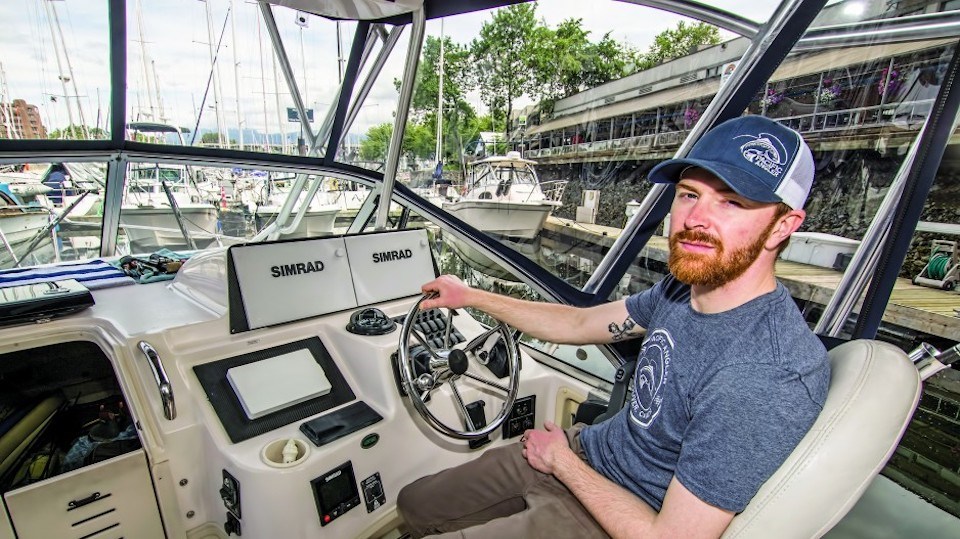This summer, for the first time in two years, Americans and other international visitors will be welcomed back to B.C. to camp, fish, kayak, cycle, hike and generally enjoy the great outdoors.
Americans traditionally accounted for a significant amount of the business for B.C. sport fishing guides, charters and lodges, so pandemic-related border closures and travel restrictions in 2020 and 2021 took a big bite out of their business.
On the other hand, the industry saw a surge in domestic customers, with many British Columbians trying salmon fishing for the first time.
“Now this year, where it’s even maybe a little further step towards normal, the expectation is that it is going to be very, very busy,” said Owen Bird, executive director for the Sport Fishing Institute of BC.
“A lot of U.S. customers returning may have booked a trip in 2020 and weren’t able to take it, and finally they can come back.”
The sport-fishing sector generates about $1.1 billion annually in economic activity, Bird said. There are roughly 300 businesses related to sport fishing – guides, charters, lodges and tackle shops.
While some B.C. salmon stocks have suffered alarming declines, those targeted by sport fisherman – notably chinook and coho – appear to be healthier than expected in some areas.
“The last couple of years, there’s been some very strong returns of salmon in different areas,” Bird said.
In 2020, provincial campgrounds were restricted to B.C. residents only. This year, for the first time since 2019, they will again be open to American visitors.
Due to travel restrictions, many British Columbians who might have otherwise travelled outside B.C. or Canada in the summer were forced to stay close to home, and many went camping in 2020 and 2021.
“I don’t expect this year to be as big as we saw in the last couple of years,” said Jamie Cox, president of the BC Lodging and Campgrounds Association. “There was literally an explosion in outdoor recreation in the last two years.”
In B.C., booking a campsite in the more popular provincial parks has long been a challenge. Since 2017, BC Parks has added 1,700 campsites to provincial park campgrounds, including 90 serviced sites in E.C. Manning Park, bringing the total of provincial campsites to around 11,000, and this year it launched a redesigned reservation system (camping.bcparks.ca) intended to make booking easier.
Even so, campers who don’t reserve months in advance can still find themselves out of luck, especially on long weekends in the more popular campgrounds.
Fortunately, there are more than 400 private campgrounds in B.C. representing about 22,500 campsites. Private campgrounds can be a profitable business, especially those catering to the recreational vehicle (RV) crowd, some of whom may stay in RV parks and campgrounds year-round, not just in summer.
Kampgrounds of America (KOA), the world’s largest owner of private campgrounds, owns two in B.C., and Parkbridge Lifestyle Communities, a 91原创 company, owns 38 resorts and campgrounds across Canada, including four in B.C.
Cox manages Parkbridge’s Gallagher Lake Resort near Oliver.
“I operate a resort that takes a gross revenue of $1 million to $1.2 million [annually],” Cox said. “That’s just one of ours.”
The Gallagher Lake resort has tenting, full-service sites for RVs and cabins.
“We started with four cabins here eight years ago, and now I’m at 14, with an ultimate build-out at 18,” Cox said. “The more I build the more they’re filled. This resort has grown in double-digit values and occupied nights eight years in a row. The last year was massive growth.”
If you don’t mind roughing it, there are 1,300 rustic forest service campsites, available on first-come, first-served basis, and searchable at sitesandtrailsbc.ca.
First Nations in B.C. also offer a number of unique camping and fishing experiences. Indigenous Tourism BC lists 11 campgrounds and resorts operated by First Nations, like the Klahoose Wilderness Resort near Lund on the Sunshine Coast, as well as a number of First Nations fishing charters.
For multi-day outdoor adventure, premier destinations in B.C. include the West Coast Trail, the Bowron Lakes canoe circuit, the Broken Group Islands (kayaking), the South Chilcotins (mountain biking and horseback riding), and the Berg Lake trail in Mount Robson Provincial Park.
Unfortunately, the Berg Lake trail is closed for the summer, due to flood damage, and may not be fully opened again until 2025. The Bowron Lake circuit was similarly closed in 2020 due to storm damage. This is one of the complaints noted in a recent survey of outdoor enthusiasts: the inability of BC Parks to keep up with trail and bridge repairs and basic trail maintenance.
An Ipsos survey done for the Outdoor Recreation Council of BC confirmed “soaring interest” in outdoor activities. It also identified some top irritants for park users: lack of washrooms, parking and reservable campsites, overcrowding and poorly maintained trails.
“BC Parks is definitely not resourced to be able to take all the necessary maintenance or the expansion that is necessary to accommodate a growing population – a population that is increasingly interested in spending time outside in our parks,” said recreation council executive director Louise Pedersen.
As for overcrowding in popular parks like Joffre Lakes, Garibaldi and Golden Ears, which has prompted BC Parks to continue requiring day passes, the issue isn’t too many people on the trails, Pedersen said, but simply a lack of parking.
“There is long-standing under-investments in our recreational infrastructure,” Pedersen said. “Now really is the time to start to invest more in garbage containers, signage, outhouses, more and improved trails and more opportunities for camping.”



